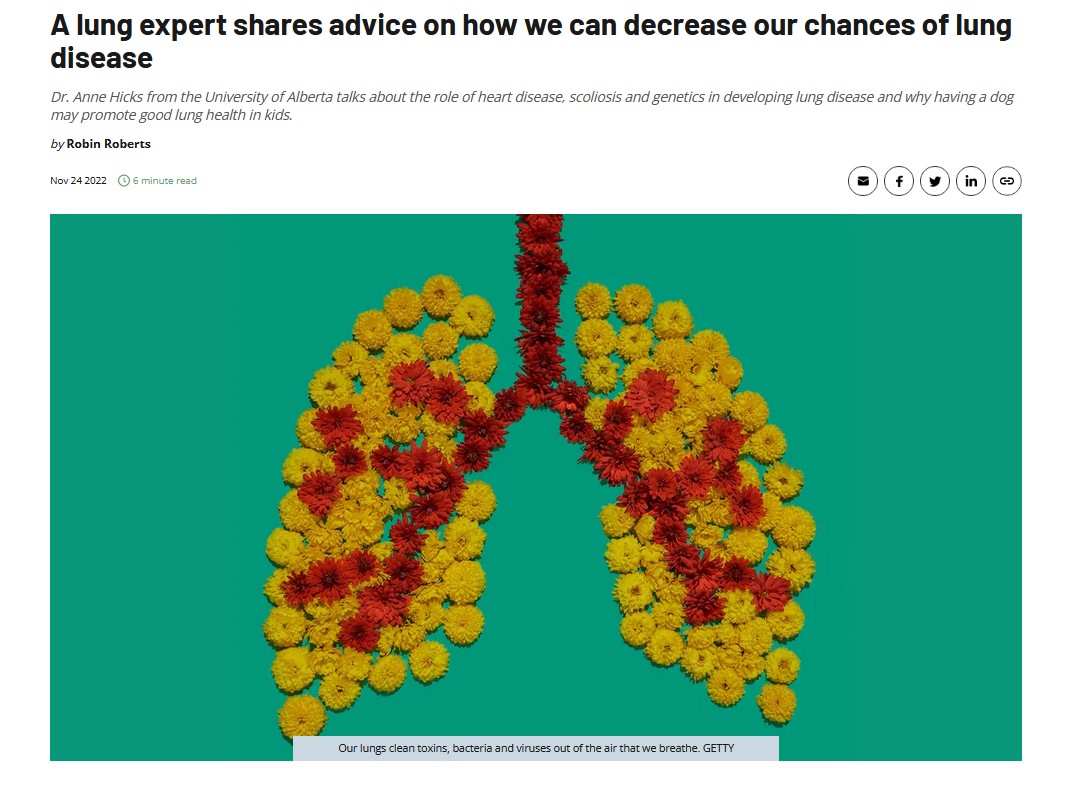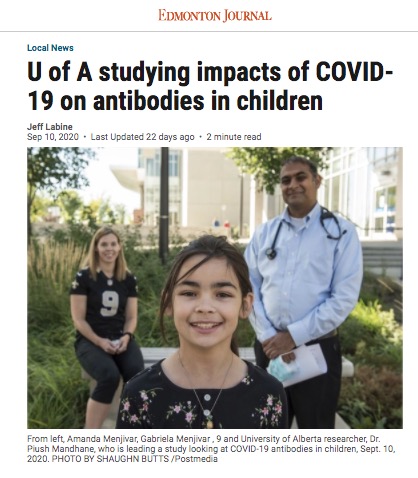News and Events
|
Dr. Anne Hicks from the University of Alberta discusses the role of heart disease, scoliosis and genetics in developing lung disease and why having a dog may promote good lung health in kids. Topics covered include the process of how our lungs filter the air around us, and the toxic substances that can negatively impact the health this vital organ. Dr. Hicks talks about the importance of good lung health and the steps we can take in our everyday lives to achieve a better overall quality of life. |
|
|
Sept. 13/22 |
A new University of Alberta laboratory is working to understand how altered microbiota — fungi, bacteria and viruses in the gut and lungs — are linked with mood disorders such as depression and inflammatory immune conditions such as asthma. |
|
Dr. Giovanni Ferrara, professor and director of the Division of Pulmonary Medicine in the Faculty of Medicine & Dentistry, was highlighted recently in Folio. The article highlights a new feasibilty study involving 40 patients that could help those dealing with long-term chronic respiratory issues by using new wearable technology and artificial intelligence to monitor symptoms and warn of coming exacerbation episodes. According to Ferrara, the device tracks clinical signs and symptoms that can inform treatment decisions tailored to the patient’s needs, providing more precise control over the disease. The device also allows health-care providers to fine-tune the intensity of treatment based on the intensity of symptoms related to the phase of the pulmonary disease. |
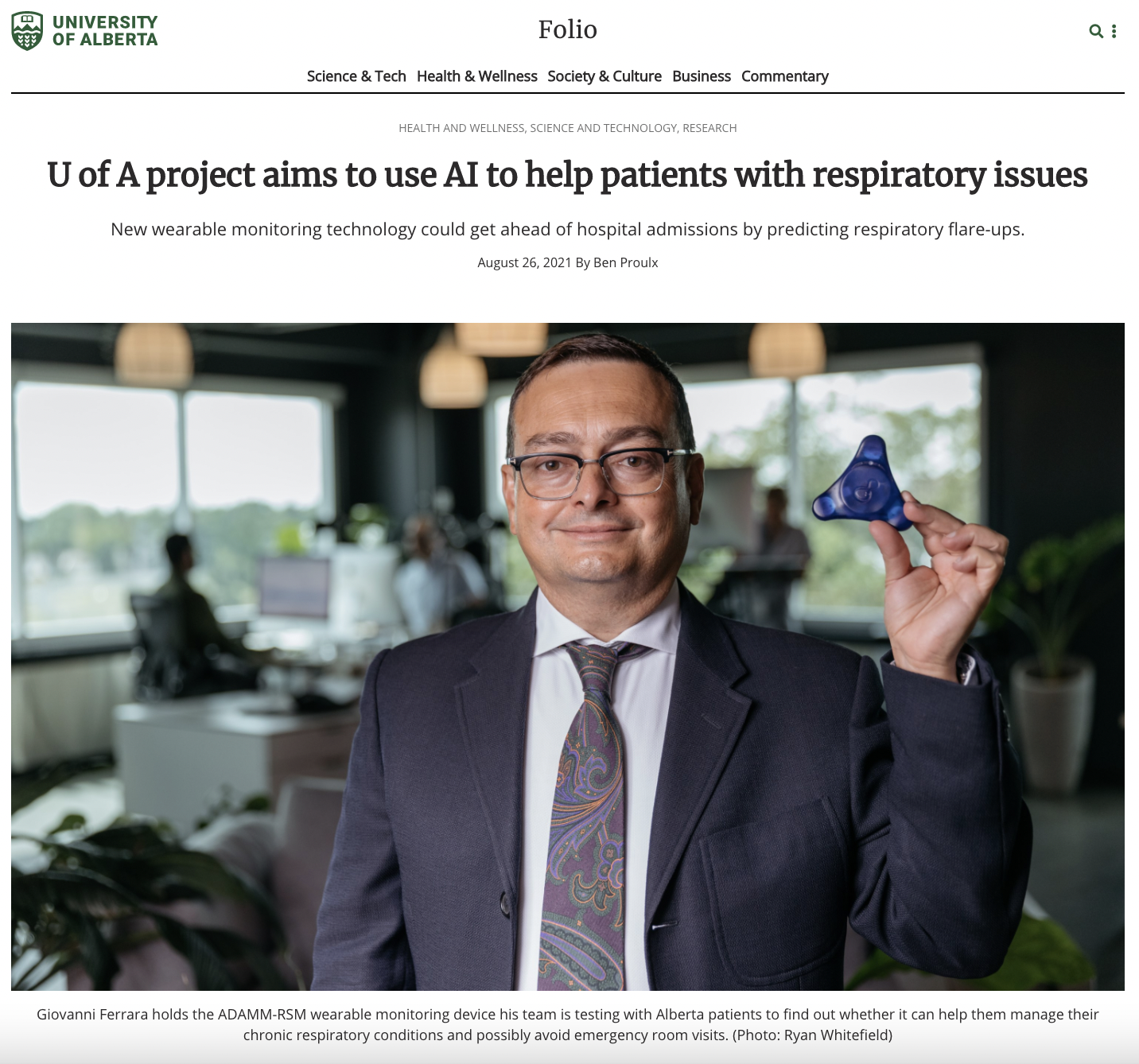 |
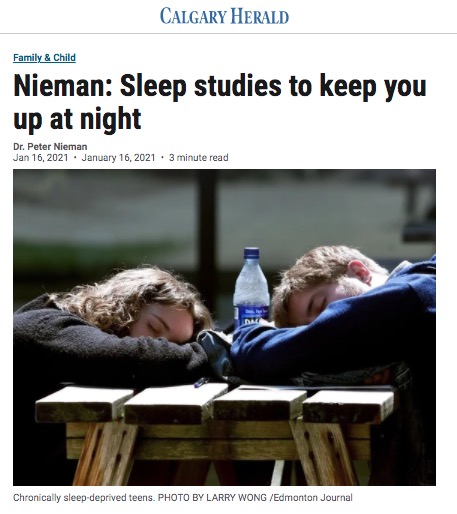 |
Dr. Subhabrata Moitra's work was highlighted in the Calgary Herald (16/01/21). The article highlights the study, which questioned 1,684 adolescents aged 13 and 14 about their sleep preferences and respiratory health, as part of the Prevalence and Risk Factors of Asthma and Allergy-Related Diseases Among Adolescents (PERFORMANCE). Teenagers who stayed up late had a higher risk of wheezing, rhinitis and conjunctivitis related to allergies. Specifically, for asthma, there was a three times higher risk among the teenagers who were night owls as opposed to the larks, who were the teens who went to bed early and got up early. |
|
|
Dr. Piush Mandhane, associate professor of pediatrics, was featured in the Edmonton Journal (10/09/2020) for his research on children and COVID-19. He is leading a two-year study to evaluate how COVID impacts children, with 3 key questions: 1) how many children have been exposed to the virus 2) how long their antibodies lasted 3) what the antibody levels look like in comparison to adults. |
|
Dr. Allison Carroll, pediatric respirologist, provided valuable expertise for a Cochrane.com article about helping to support kids in the pandemic. She gives great advice to help kids want to put on a mask. 02/09/2020 |
 |

Dr. Anita Kozyrskyj and the CHILD study have released some interesting findings that were highlighted on Research2Reality (03/09/2020)
Ultimately “fed is best” when it comes to infant nutrition, but breastfeeding still seems to provide certain benefits. These benefits, such as a reduction in obesoty, allergies and asthma, are thought to be linked to gut bacteria. The current study that spending time in nature can shift a formula-fed baby’s gut microbiota towards that of breastfed peers. Read the article here.
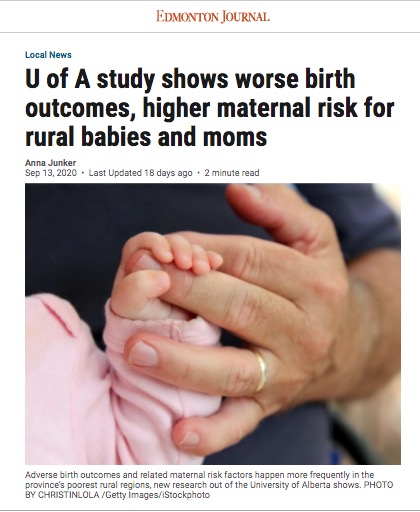 |
Adverse birth outcomes and related maternal risk factors happen more frequently in the province’s poorest rural regions, new research out of the University of Alberta shows. Dr. Maria-Beatriz Ospina, a perinatal epidemiologist and assistant professor of obstetrics and gynaecology and medicine at the University of Alberta, who led the study. The study was highlighted in the Edmonton Journal (13/09/2020). Read the article here. |
The September 10 edtion of Folio highlights the work of Dr. Piush Mandhane, who is leading a study to evaluate COVID-19 antibodies in the blood of children returning to school in Alberta.The project, funded by a grant of nearly $700,000 from the Government of Alberta, will use serology testing to detect the presence of antibodies in the participants' blood, which indicates they have been exposed to the COVID-19 coronavirus in the past. Data from the study will be shared with Alberta Health, providing valuable information to the province as it continues to shape and revise its response to the virus. See the full article here!
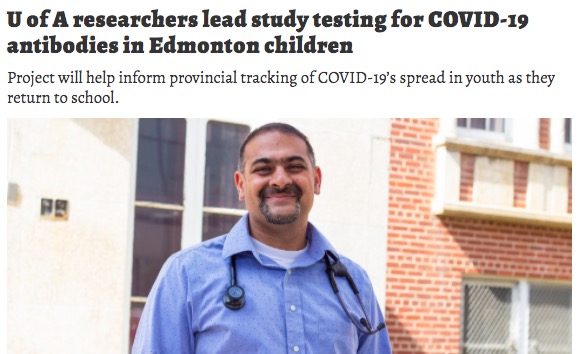
St.AlbertToday.ca - Dr. Moitra Discusses his findings about teenagers, sleep, and asthma and allergies.
See the article here
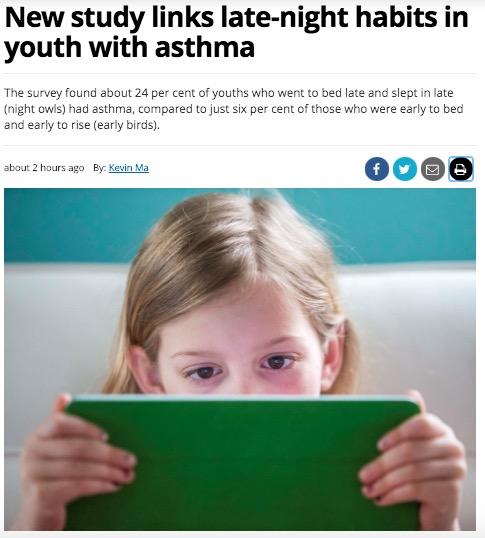
Folio - Asthma and allergies more common in "night owl" teens: study
Distruptions to melatonin may be the link, researchers suggest
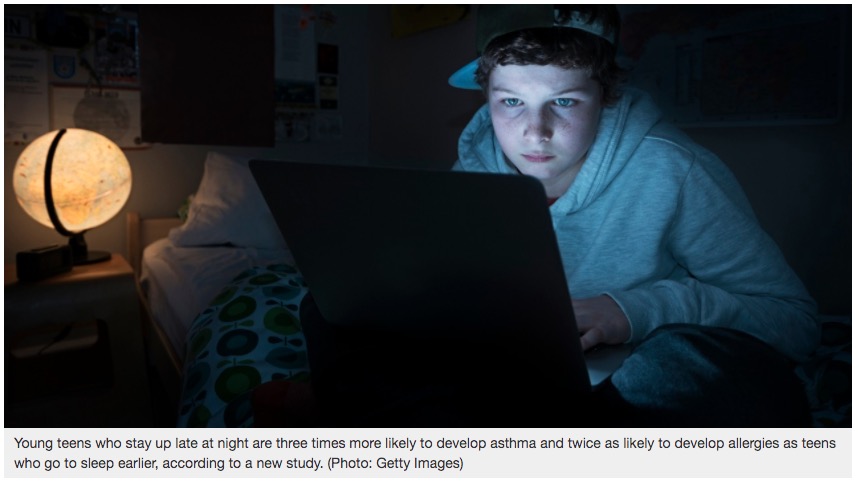 Subrahrabrata Moitra a post-doctoral fellow in the Division of Pulmonary Medicine and a member of the Alberta Respiratory Centre at the University of Alberta found that teenagers who prefer to stay up late at night and sleep in late the next day are more likely to develop asthma and allergies than their “early bird” counterparts." Compared to the morning type, those who go to bed late have approximately three times higher risk of developing asthma". This is the first study of its kind. Read the full Folio Article Here!
Subrahrabrata Moitra a post-doctoral fellow in the Division of Pulmonary Medicine and a member of the Alberta Respiratory Centre at the University of Alberta found that teenagers who prefer to stay up late at night and sleep in late the next day are more likely to develop asthma and allergies than their “early bird” counterparts." Compared to the morning type, those who go to bed late have approximately three times higher risk of developing asthma". This is the first study of its kind. Read the full Folio Article Here!
Congratulations to Dr. David Marchant, Assistant Professor in Medical Microbiology and Immunology, and member of ARC, in publishing a paper in Nature, one of the world's top journals. The paper examines a novel entry receptor for respiratory syncytial virus (RSV), a major respiratory virus responsible for the deaths of many children around the world. This discovery will help us devise new therapeutic strategies for the treatment of RSV infections.
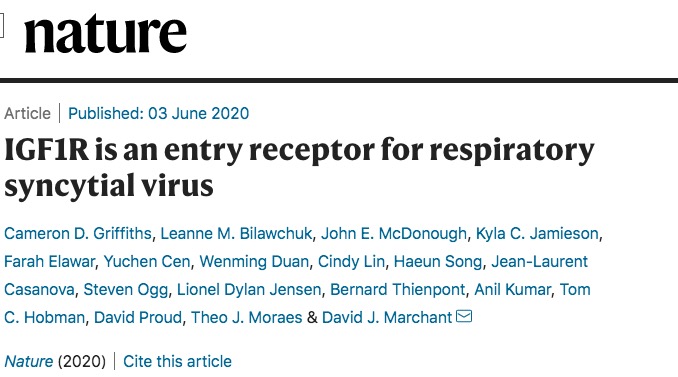
In the News:
Dr. David Marchant, Associate Professor. Department of Medical Microbiology & Immunology

Folio Article (June 19, 2020). Dr. Marchant discusses COVID-19. Click Here to read the article

